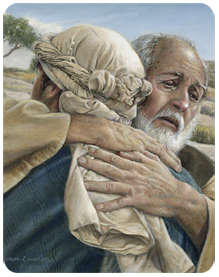
Food For Your Soul
by Reverend Hubermann Larose
Si vous voulez lire ce texte en français cliquez ici!
The Parable of the Two Sons
(Mat. 21:28-32)
This parable, considered to the simplest and the clearest of all parables, features a father who evidently represents God, the Father to whom we owe our existence, and whom therefore we ought to fear and obey.
This father has two sons, not three. We see this division in two all throughout the Bible from Genesis to Revelation: the seed of the woman vs. the seed of the Serpent; Cain and Abel; the sons of men and the sons of God; the wheat and the tare; the children of the Father and the children of the Evil One; the children of light and the children of this world, etc.
As far as God is concerned, there are only two categories of people—those who say yes to Him and those who say no. These two categories have also two destinations awaiting them: heaven or hell, eternal life in God’s presence or eternal damnation away from Him; everlasting bliss or everlasting punishment.
Men, however, have invented a third category; they’ve given a third son to the Father—a son who says neither “yes” nor “no;” a son who sits on the fence; who is not openly against God, but who is not either for Him. However, the Bible makes it clear that there is no such thing as a neutral ground vis-à-vis God. “He who is not with me is against me,” said Jesus. (Mat. 12:30)
Let’s now consider the answer given by each of the two sons.
I. THE SON WHO SAID YES
His father bid him to go work in his vineyard; he refused categorically by saying “No!” His blunt answer is an act of rebellion against his father’s authority.
The father’s reaction is a bit surprising to us. He didn’t vindicate his right to be obeyed and consequently force his son into subjection to his authority. This gives us an insight into God’s character with respect to the way He deals with people.
- God never forces anyone to serve Him.
- He seldom judges immediately those who rebel against Him.
This delay in the manifestation of God’s judgment fuels the arrogance of sinners when, on the contrary, they should take advantage of it to repent. “Do you show contempt for the riches of his kindness, tolerance and patience, not realizing that God’s kindness leads you toward repentance?” (Rom. 2: 4)
One good thing, though, about this son, is his sincerity. Why say “yes” when in fact you mean “no.” However, Jesus didn’t praise him because of his sincerity, but because he repented. The apostle Paul says that, before his conversion, he acted in ignorance and unbelief. Fortunately, he repented, and the times he lived in ignorance were overlooked. The first son also repented: “afterward he regretted it and went.” (Mat. 21:29) He had a bad beginning, but he ended well… Just like Paul: “I was once a blasphemer and a persecutor and a violent man, (but) I was shown mercy because I acted in ignorance and unbelief.” (1 Tim. 1:13)
Oh! the wonderful grace of God that’s “broader than the scope of our transgressions” and always disposed to forgive the repentant sinner!
II. THE SON WHO SAID YES
He’s apparently obedient. So many people nowadays are apparently obedient to God! They profess what they don’t possess. They have “a form of godliness,” but they “deny its power.” (2 Tim. 3:5) The apostle James scolds such people in his letter. He calls them hearers of the word who never bother doing what they hear. (James 1:22-25)
The son who said yes is just like that; just like these people in the pew who welcome the preaching of the Word with a resounding “Amen!” but who never care about putting into practice what they hear.
Two observations can be made concerning this son:
- He answered readily. He did so because he had no real desire to obey his father. Saying yes is easy for someone who has no intention to keep his word.
- He answered with reverence, with politeness. “Yes, Lord!” But he never went. It’s for this son and people like him that Jesus said in Mathew 7:21:”Not everyone who says to me, ‘Lord, Lord,’ will enter the kingdom of heaven, but only he who does the will of my Father who is in heaven.”
The Lord is not impressed by our politeness, but by our obedience.
Jesus states at the end of the parable a solemn truth that is worth noting: “I tell you the truth, the tax collectors and the prostitutes are entering the kingdom of God ahead of you.” (v. 32) The equivalent of what we call today junkies, drug addicts, drug dealers, so on and so forth, will enter the kingdom of God ahead of many people who sit in the pew. The latter are in danger of never repenting, because they are deluding themselves, never realizing how “wretched, miserable, poor, blind, and naked” they are. (Rev. 3:17)
There is more hope for a self-confessed sinner than for a hypocrite Christian. But the utterance of this parable is in itself a call to repentance addressed to those sons (and daughters) who keep saying yes to the Father, but who never do what He commands them to do. The Church of the Laodiceans was full of people like that. From outside that Church that obviously has turned him out, Jesus said to its members, “Here I am! I stand at the door and knock. If anyone hears my voice and opens the door, I will come in and eat with him, and he with me.” (Rev. 3:20)
Maybe God is knocking at your door right now. Will you open and invite Him in? May the Holy Spirit help you do just that! AMEN!
Hubermann Larose
Associate Pastor
Si vous voulez lire ce texte en français cliquez ici!
